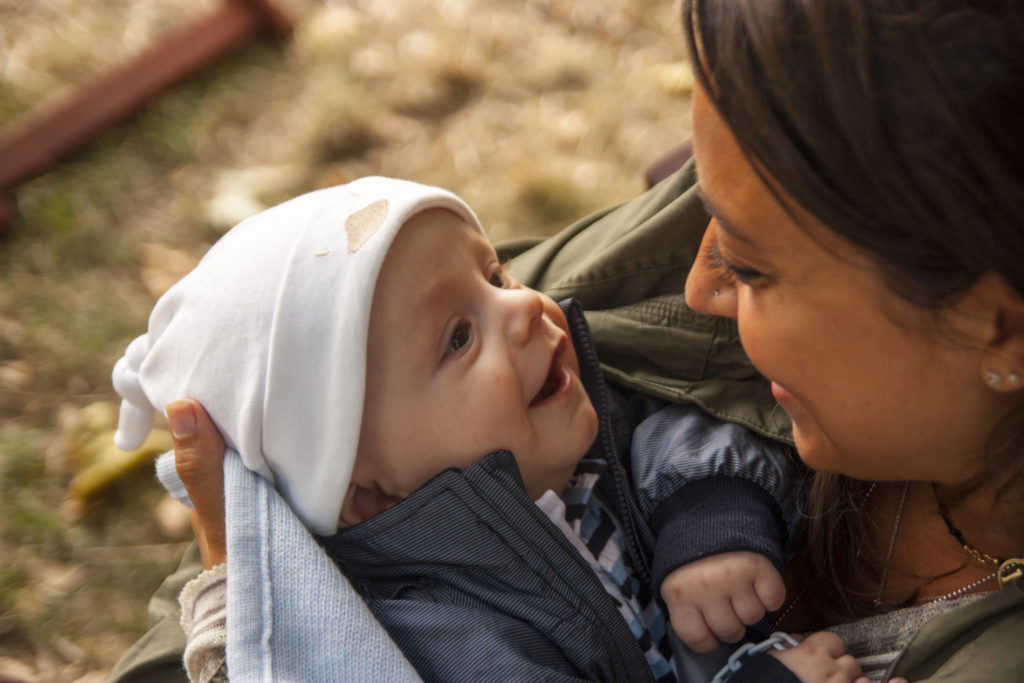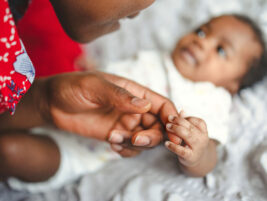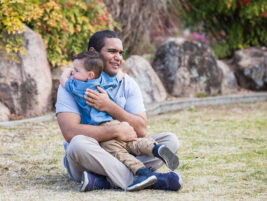‘Infant’; ‘Mental’; ‘Health’ are three simple words that evoke a multitude of meanings. Recognised as an interdisciplinary field that has progressively grown internationally over the past 35 years Infant Mental Health (IMH) can be defined as:
The healthy social and emotional development of a child from conception, to birth and through to five years; and a growing field of research and practice devoted to the:
- promotion of healthy social and emotional development;
- prevention of mental health problems; and
- treatment of the mental health problems of very young children in the context of their families (Zero To Three, 2012).
IMH in practice can be expressed in a multitude of ways within the parent-infant/ young child dyad. At a promotional level it is focussed on such concepts as ‘first relationships matter’ (Michigan Association for Infant Mental Health, 2012) ensuring parents, caregivers and professionals have the knowledge and awareness about why a caregiver’s nurturing emotional relationship with their child is of vital importance in the early years. The wealth of empirical evidence has provided professionals with knowledge that an infant and young child’s experience of loving close predictable relationship:
- Supports early brain development
- Promotes a baby/young child feeling safe and secure
- Teaches a baby/young child to communicate through smiling, gestures, cries and words
- Helps a baby/young child to express and regulate feelings and manage behaviour and to learn and think
(Michigan Association for Infant Mental Health, 2012)
Preventive approaches in IMH focus on developing parental sensitivity and responsivity. The aim at this level is to enhance secure attachment behaviours and prevent the development of more serious psychopathology in infants and young children who are considered to be at risk due a range of vulnerabilities including and not limited to maternal mental health difficulties, prematurity, abuse and neglect and adverse childhood experiences such as poverty.
Disorders in infancy and early childhood do exist and there is a need for tertiary level service provision in IMH that offers intervention and treatment services specifically targeting symptoms indicative of a clinical disorder in this developmental period. Exposure to trauma, abuse, neglect and parental mental illness are established factors that contribute to the development of clinical disorders in infancy and early childhood. These are expressed in a multitude of ways, including disturbed infant-caregiver interactional patterns, early developmental or medical problems in the infant, and/ or chronic functional disorders (crying, sleeping, and feeding). Typically ‘disturbances to early development are seen as arising from an interplay of factors in the infant, parent and their environment’ (Mares, Newman & Warren, 2011, p. 20) thus requiring practitioners to be skilled in providing interventions that address the range of complexities that present in this developmental period.
Across promotion, prevention, intervention and treatment services in IMH the goal is to reduce suffering and pain. This includes preventing adverse outcomes across the lifespan and promoting healthy development by enhancing emotional well-being and interpersonal competence for infants, young children and their families (Zeanah, 2009).
In order to achieve these goals there is a need for comprehensive approaches to interventions across promotion, prevention, intervention and treatment levels that:
- Support and enhance a caregiver’s capacity to nurture infants and young children emotional and social development
- Ensure families in need to additional services can access and successfully engage with them
- Increase the ability of the community to identify, address and prevent social and emotional problems in infancy and early childhood (Zeanah, 2009).
Complexities in defining the IMH workforce
The complexity and uniqueness of IMH comes with the interdisciplinary nature of the field as it belongs to all practitioners working with infants, young children and their families. There are multiple ports of entry into a parent-infant/young children relationship. The target of intervention can vary, ranging from:
The infant/young child’s behaviour (a baby who cannot be soothed by his/her caregiver and is constantly distressed and irritable;
A toddler who is showing aggressive behaviours towards his/her peers and staff as he transitions to day care);
The caregiver’s behaviour (a first time mother who presents with severe anxiety that prevents her from emotionally connecting to her baby in fear of harming him/her);
Caregiver representations of their relationship with their infant/young child (caregivers who tell us ‘I don’t like my child, ‘I wish I had never had this child’); and/or
The social context in which the child is developing (exposure to parental violence and drug use).
An IMH model of assessment and intervention requires practitioners to consider the dynamics and processes of how relationships function between an infant/young child and its primary caregivers, rather than solely focusing on the presenting concern or port of entry that first presents to the practitioner. The settings can be different and IMH concerns can present in either adult or child services. Despite different ports of entry and variation in how the suffering presents the focus of intervention is the same. That is, improving the dyadic and family relationships as they directly impact on the infant/young child’s development and behaviour across the lifespan and the caregiver’s experience of being a parent.
Challenges of defining the workforce
The diversity of the I-ECMH workforce is such that it is often difficult to delineate and is ‘not clearly defined by professional discipline, service settings, or traditional academic training programs’ (Huang, Macbeth, Dodge, & Jacobstein, 2004, p. 168 ). It is often fluid and crosses traditional siloed departments. In addition, mental health issues in infants and young children are often first identified in primary health care, child protection, community based interventions, parenting programs, and early learning centres rather than in tertiary mental health services. Typically these settings are not organised around provision of mental health services (Huang et al., 2004). The workforce needs to have the capacity to provide a service that can focus on the infant-parent relationship across the range of settings.
Infant mental health work is complex, and requires a range of skills, knowledge and competencies including the ability to assess risk both to mothers and infants and the ability to take appropriate action so as to safeguard individuals and families, many of whom are extremely vulnerable. It is essential that everyone working in this area of care keeps up to date with the required levels of knowledge and practice in relation to safeguarding procedures (NHS North West, 2011, p. 32).
The workforce includes universal and targeted services as well as tertiary level specialist intervention services. Attention to primary and secondary service providers (examples include and are not limited to Child Health, General Practitioners, Community Parenting Services and Early Childhood Educators) is an important factor when considering a workforce development plan in IMH. This is in keeping with current shifts to create a wider sense of responsibility for IMH that includes services involved in promotion and prevention and understanding of the importance of proportional universalism.
To provide these services to families, Western Australia requires a highly skilled workforce to provide specific relationship based intervention strategies in addition to simultaneously paying attention to the developmental trajectory of the infant or young child to ensure prevention of future development disturbances (Zeanah, 2009). Infants and young children cannot request a service or verbally communicate how they are suffering, therefore as professionals there is a responsibility to advocate and provide infants and young children with the service they require.
AAIMHI WA’s response to building workforce capacity in IMH
The Australian Association for Infant Mental Health West Australian Branch Incorporated (AAIMHI WA) is a professional interdisciplinary organisation. It is an active member of the national association (AAIMHI) and is affiliated with the World Association for Infant Mental Health (WAIMH). AAIMHI WA aims to improve the profile and importance of the infancy and early childhood developmental period. The association provides a forum for multidisciplinary interactions and collaboration. Its focus is the promotion of, and support for, the optimal development of infants, young children and their families (conception to 5 years) within a relationship based framework. For over two decades AAIMHI WA has offered training and networking opportunities to a range of professionals in order to enhance knowledge and skills related to Infant Mental Health.
A key strategic aim for AAIMHI WA is to build both capability and capacity in the WA workforce. To this end AAIMHI WA collaborated with the Western Australian Mental Health Commission (WA MHC) on the ‘Building the Mental Health of Infants and Young Children: Workforce Competency Based Training Project’ (2015). The WA MHC has a number of functions including development and provision of mental health policy and advice to the government, leading the implementation of the Mental Health Strategic Policy, and providing grants, transfers and service contract arrangements. This joint AAIMHI WA and WA MHC project commenced in 2013 and over 60 interviews were conducted with stakeholders involving individual or small groups of practitioners from all disciplines and levels of service (including AAIMH WA members, managers, trainers, academics, policy officers and administrators), published in March 2015 and viewed online.
The project was an innovative response to the growing awareness in the professional community of the need to up-skill people from a range of professions who are working with infants, young children and their families. Key findings from the project were that:
- WA has a dedicated workforce that is open to change and is aware of the need to develop best practice guidelines for working with infants, young children and families.
- There was unanimous support for the development of a reflective practice supervision framework in the IMH workforce. Practitioners and services expressed a desire for a platform to begin implementation of reflective practice supervision into the workforce.
- The most authoritative and comprehensive set of competency guidelines currently in existence is that of the Michigan Association for Infant Mental Health, (MI-AIMH) Competency Guidelines and Endorsement for Culturally Sensitive, RelationshipFocused Practice Promoting Infant Mental Health®(2002a, 2002b). An important component of the MI-AIMH Framework is that it articulates IMH competencies specific to reflective practice across four levels. Providing a structure for building and more importantly sustaining skills in the field.
These findings supported AAIMHI WA’s focus on workforce development and highlighted the need to adopt a set of competency guidelines that are internationally recognised as the gold standard in IMH. After careful consideration among the AAIMHI WA committee members, consultation with the wider WA IMH community and in response to findings and recommendations from the ‘Building the Mental Health of Infants and Young Children: Workforce Competency Based Training Project’ AAIMHI WA purchased a license from the Michigan Association for Infant Mental Health (MI-AIMH) to begin using the MI-AIMH Competency Guidelines® as standards to promote IMH in WA. The AAIMHI WA Competency Guidelines® were officially launched in March 2015 by Dr Deborah Weatherston, Executive Director of MIAIMH.
Western Australia is leading the way internationally as the first Affiliate of the World Association for Infant Mental Health (WAIMH) outside the United States of America to have a licensing agreement to use the MI-AIMH Competency Guidelines®. AAIMHI WA has now joined the Alliance and will collaborate with colleagues in the USA as they embark on the implementation phase of building workforce capacity using the AAIMHI WA Competency Guidelines®.
Establishment of the AAIMHI WA Competency Working Group
Following purchase of the license from MI-AIMH expressions of interest were sought from suitably qualified and committed members to form the AAIMHI WA Competency Working Group. It consists of 11 AAIMHI WA members and can be defined as a group of professionals with an interest or focus on perinatal and IMH from a range of disciplines across a number of agencies working in metropolitan and rural regions of WA.
The following disciplines are represented in the group: Speech Pathology, Nursing, Psychology, Education, Social Work and Psychotherapy, working across government and non- government services spanning across mental health, education, maternity, child health services in community and hospital settings.
The purpose of the Working Group is to support the implementation of the AAIMHI WA Competency Guidelines® into the WA workforce across promotion, prevention, intervention, and treatment levels of service.
Responsibilities include:
- In collaboration with MI-AIMH and consultation with key stakeholders, review and modify the MI-AIMH Competency Guidelines®, as needed, to assure that all terms and provisions are culturally appropriate for the WA context.
- Critically review and modify the MI-AIMH Competency Guidelines®, as needed, to assure that all terms and provisions are culturally appropriate for Aboriginal and Torres Strait Islanders.
- Implement the AAIMHI WA Competency Guidelines® in WA, in collaboration with stakeholders, and develop partnerships for working collaboratively across services and agencies to build workforce capacity in the promotion of IMH in WA.
- Provide advice and links to people and information on the AAIMHI WA Competency Guidelines® and how they can guide training and building IMH Competencies across all levels of service provision.
- Share and disseminate information on events, announcements, and initiatives that relate to the AAIMHI WA Competency Guidelines® and building workforce capacity in IMH in WA.
- Develop a training model for the AAIMHI WA seminar series and other trainings offered by AAIMHI WA that is developmental and meets specific competencies within the AAIMHI WA Competency Guidelines®.
The Competency Working Group in collaboration with MI-AIMH reviewed and modified the MI-AIMH Competency Guidelines® to assure that all terms and provisions are culturally appropriate for the WA context.
AAIMHI WA specifically acknowledges the particular importance that Australian Aboriginal and Torres Strait Island people have in our society. The AAIMHI WA Competency Working Group will continue in collaboration with Aboriginal and Torres Strait Island communities and in consultation with elders to make these competencies meaningful and relevant for infants and young children and their families in these communities.
Next Steps for AAIMHI WA
The framework offers the workforce a professional development plan that focuses on knowledge, best practice skills, and reflective work experiences that lead to increased confidence and credibility across the many disciplines in the infant, early childhood and family services sector. The AAIMHI WA Endorsement® will inform prospective employers, agencies and peers about culturally sensitive, relationshipfocused practice promoting IMH. The AAIMHI WA Competency Guidelines® is the first stage of the workforce development plan in IMH and the endorsement process is the second stage of competency building being implemented in WA by AAIMHI WA.
AAIMHI WA Seminar Series aligned to AAIMHI WA Competency Guidelines®
For two decades AAIMHI WA has offered training and networking opportunities to a range of professionals in order to enhance knowledge and skills related to IMH principles and practice. This has been through the AAIMHI WA seminar series in addition to numerous other training events AAIMHI WA has hosted.
In consultation with AAIMHI WA members the AAIMHI WA Seminar Series is now aligned to specific competencies from the AAIMHI WA Competency Guidelines®. The AAIMHI WA seminar series in 2015 follows a developmental pathway to build skills progressively across the core areas of knowledge, skills and practice in IMH. The informal feedback received from members since the introduction of these changes has been very positive.
The AAIMHI WA Competency Guidelines® is providing a structure and a framework to ensure the seminars offer a quality training experience that provides knowledge and skills in IMH. Increasing the seminars from one to two hours in duration gives participants an opportunity for reflection and increases the possibility of integrating new knowledge and skills in IMH into their everyday practice. The seminars provide participants with an introduction to skills that practitioners may choose to develop further through more formal education or conference attendance.
Collaboration and engagement with organisations providing training and skill development in IMH
The AAIMHI WA Competency Guidelines® are available in WA and there will be ongoing collaboration with agencies that are providing training and skill development in IMH. It is anticipated that as training programs are developed and implemented that AAIMHI WA can contribute to developing a more cohesive and integrated training framework for WA that is aligned to the AAIMHI WA Competency Guidelines®. Collaborations with government services such as Child and Adolescent Mental Health Services and Edith Cowan University (ECU) have commenced to develop IMH training that is aligned with the AAIMHI WA Competency Guidelines®.
At ECU in August 2014, a working party was established, led by Associate Professor Lynn Priddis, which included representatives of the departments within the School of Psychology and Social sciences. This team with some external assistance from AAIMHI WA developed the proposal for a Master Degree course in IMH. It was passed at the March 2015 meeting of the ECU University Academic Board.
The IMH course is due to run from February 2016, with applications invited later this year. It is a two year full time or four year part time Master Degree course in IMH with exit points after one and two years respectively for a Postgraduate Certificate in IMH and aligns with Australian Quality Framework levels eight and nine. Course delivery will draw upon experts in the WA IMH and professional communities for input (including and not limited to paediatrics, psychiatry, psychology, physiotherapy, nursing, counselling, speech pathology, social work and occupational therapy).
The course is written to align with the AAIMHI WA Competency Guidelines®. It is aimed at those with a Bachelor Degree who are already working with infants, young children and their families. It has an emphasis on reflective practice and will include Infant Observation, a research project, and units in theories of IMH, Foundations of IMH, Assessment and Formulation in IMH, Interventions in IMH and current issues and global perspectives in IMH. It will emphasise culturally sensitive practices and will engage and collaborate with local Aboriginal elders and Aboriginal communities to incorporate these in to the course.
ECU has also recently established the ‘Pregnancy to Parenthood Clinic’, a free perinatal and IMH service for caregivers, infants, young children and families from pregnancy through to three years. It is a training program for students completing the Master of Clinical Psychology degree and is the first training program of its kind in Australia. This training program is designed to ensure the clinical psychology students meet standards specified in the AAIMHI WA Competency Guidelines®.
MI-AIMH Endorsement for Culturally Sensitive, Relationship-Based Practice Promoting Infant Mental Health® license (Endorsement®), from MIAIMH
Following implementation of the AAIMHI WA Competency Guidelines® over the next two to three years, the next step for AAIMHI WA is to purchase a workforce recognition initiative, the MI-AIMH Endorsement for Culturally Sensitive, Relationship-Based Practice Promoting Infant Mental Health® license (Endorsement®), from MI-AIMH.
In preparation, members of the Competency Working Group will work towards earning the Endorsement® through MI-AIMH. Criteria for Endorsement® include committing to group based reflective supervision in IMH, participating in competency-informed trainings and working with infant, young children and their families using a relationship based IMH model of practice.
Following purchase of the Endorsement® license by AAIMHI WA and with technical assistance from MI-AIMH, members of the Competency Working Group will implement the Endorsement® system in WA. They will also have a qualification that recognises their capacity to provide reflective practice supervision to practitioners in WA working in the field of IMH across disciplines and levels of service.
The WA Mental Health Commission (WA MHC) has awarded the AAIMHI WA Competency Working Group with a grant to support implementation of the AAIMHI WA Competency Guidelines®. In December 2014, the WA MHC provided funding for the 11 members of the Competency Working Group to receive 2 hour group based reflective supervision for 12 months. Beulah Warren, an experienced psychologist and inaugural Co-ordinator of the Master of IMH program at the NSW Institute of Psychiatry is providing the monthly reflective supervision for all three groups via Skype.
Summary
In WA there is energy and enthusiasm among the IMH community and those interested in the social and emotional well-being of families with young children in anticipation of the implementation of the AAIMHI WA Competency Guidelines® and how they can contribute to building a sustainable workforce development plan in IMH.
The Competency Guidelines® have the potential to provide a framework for building long term relationships and collaboration between all those contributing to the emotional well-being of infants, young children and their families. AAIMHI WA recognises that this can only be achieved by fully engaging the West Australian community at every step of this exciting new journey it is embarking on. Above all, it is hoped that implementation of the Competency Guidelines® will significantly contribute to improving the lives of all infants, young children and their families in Western Australia.

References
Huang, Larke., Macbeth, Gary. , Dodge, Joan., & Jacobstein, Diane. (2004). Transforming the workforce in children’s mental health. Administration and Policy in Mental Health, 32(2), 167‐187.
Mares, Sarah, Newman, Louise, & Warren, Beulah. (2011). Clinical skills in Infant Mental Health: the first three years (Second ed.). Camberwell, Victoria: ACER Press.
Mental Health Commission WA (2015). Building the Mental Health of Infants and Young Children in WA: Workforce Competency Based Training Project Perth, Western Australia.
Michigan Association for Infant Mental Health. (2012). First Relationships Matter. Southgate: Michigan.
Michigan Association of Infant Mental Health. (2002a). Michigan Association of Infant Mental Health Competency guidelines for culturally sensitive, relationship‐focused practice promoting infant mental health. Southgate: Michigan.
Michigan Association of Infant Mental Health. (2002b). Michigan Association of Infant Mental Health: Endorsement for culturally sensitive, relationship‐ focused practice promoting infant mental health.Southgate: Michigan.
NHS North West. (2011). Improving outcomes and ensuring quality a guide for commissioners and providers of perinatal and infant mental health services Retrieved August 2013, from https://www.northwest.nhs. uk/document_uploads/Maternity_ Matters/pimh_April2011.pdf
Zero To Three. (November, 2012). Emerging Issues in Infant Mental Health from the Irving Harris Foundation Professional Development Network. Zero to Three, 33(2).
Zeanah, C. H. (Ed.). (2009). Handbook of infant mental health (3rd ed). New York: Guilford Press.
Authors
Matacz, Rochelle,
President of AAIMHI WA
Priddis, Lynn,
Associate Professor,
Edith Cowan University,
Australia








